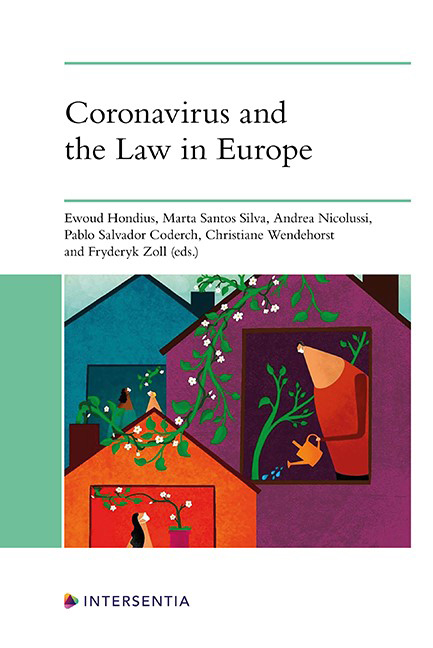Book contents
- Frontmatter
- Preface
- Contents
- List of Keywords
- List of Contributors
- PART I COVID-19 AND FUNDAMENTAL RIGHTS
- PART II STATES AGAINST THE PANDEMIC
- PART III COMPENSATION FOR COVID-19 RELATED DAMAGE
- PART IV CONTRACT LAW
- PART V CONSUMER LAW
- PART VI LABOUR AND SOCIAL LAW
- PART VII CORONAVIRUS CHANGING EUROPE
- Epilogue
- Annex: ELI Principles for the COVID-19 Crisis
- About the Editors
“Corona Contract Law” in Poland: When Pandemic Meets Politics
Published online by Cambridge University Press: 10 December 2021
- Frontmatter
- Preface
- Contents
- List of Keywords
- List of Contributors
- PART I COVID-19 AND FUNDAMENTAL RIGHTS
- PART II STATES AGAINST THE PANDEMIC
- PART III COMPENSATION FOR COVID-19 RELATED DAMAGE
- PART IV CONTRACT LAW
- PART V CONSUMER LAW
- PART VI LABOUR AND SOCIAL LAW
- PART VII CORONAVIRUS CHANGING EUROPE
- Epilogue
- Annex: ELI Principles for the COVID-19 Crisis
- About the Editors
Summary
This contribution presents and critically evaluates the impact of the COVID-19 pandemic on Polish contract law. Since the government refrained from introducing a state of emergency to manage the pandemic in Poland in violation of the Constitution, the constitutional dimension of the COVID-19 measures is of crucial importance for examination of the contract law, as it substantially changes the position of the parties in private law relations. The contribution therefore gives an overview of the measures introduced as a response to the COVID-19 emergency in the constitutional context and presents the classic Polish private law instruments potentially applicable to contracts in extraordinary circumstances like pandemic, as well as the extraordinary legislation introduced by the government in the area of contract law, with a view to addressing the pandemic. It ends by presenting the first cases initiated by private parties against the State Treasury.
INTRODUCTION
POLISH REACTION TO THE PANDEMIC
COVID-19 did not take Poland by surprise. The first case, registered on 4 March 2020, was swiftly followed by far-reaching restrictions imposed by the government, enacted as soon as 20 March 2020, when the number of registered cases had reached 425 in total (70 that day). As in many other countries, the change in circumstances in which contracts are performed in Poland in relation to COVID-19 was therefore (so far) not caused by the fact that a large number of people fell ill, causing market disturbances, but resulted from the restrictions imposed by the government with a view to limiting the spread of the disease. The strictness of the governmental measures did not, however, correspond with the number of registered cases. The restrictions started to be lifted on 20 April, at a time when there were 306 cases of the virus daily, and continued despite the fact that the number of cases did not seem to be decreasing – a situation that still continues as this contribution is being finalised (506 cases on 17 June 2020). The rather paradoxical situation whereby the strictness of the restrictions does not seem to correspond with the number of cases of infection raises questions relating to the government’s reasoning behind imposing and relaxing the measures.
- Type
- Chapter
- Information
- Coronavirus and the Law in Europe , pp. 219 - 242Publisher: IntersentiaPrint publication year: 2021



